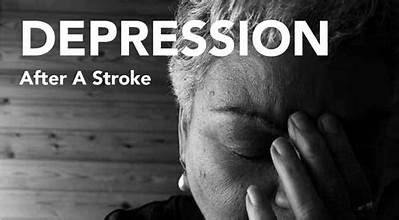Post-Stroke Depression: A Dangerous Consequence
Post-stroke depression (PSD) is a severe condition that can often be life-threatening. Stroke not only affects the body but also has a profound impact on the mind. Depression in stroke survivors is considered a serious issue by medical professionals, warranting regular screenings. Let’s delve into what post-stroke depression really is and how it can be treated.
Causes of Post-Stroke Depression
Post-stroke depression refers to depression that sets in after a stroke. There are several reasons attributed to it. Apart from the stroke itself, genetic, social support, and personality factors play a role. The sudden onset of paralysis can trigger emotional distress. Brain injury and neurochemical changes can lead to mood swings. Moreover, the stroke alters daily routines, which can affect family members who may have experienced depression prior to the stroke or who may have been depressed before.
Symptoms of Post-Stroke Depression
According to health experts, some symptoms of post-stroke depression observed in hospitalized patients are similar to those of stroke itself. These include weight loss, fatigue, and changes in sleep patterns. Other symptoms include dysphoria, anhedonia, regret over past actions, lack of concentration, difficulty in decision-making, and suicidal thoughts. Around 30% of stroke patients experience difficulty speaking, which may contribute to depression.
Changes in Post-Stroke Depression
According to health experts, patients with post-stroke depression tend to feel sad, have difficulty engaging in any activity, and find nothing enjoyable. A study in 2014 showed that the risk of depression after a stroke can be as high as 31%.
Treatment of Post-Stroke Depression
According to health experts, the treatment for depression after a stroke should be based on biological, psychological, social, and rehabilitation factors. Some studies have found therapy to be effective in treating depression in stroke patients. Behavioral activation therapy is considered the most effective, based on joyful moments in life. It shows some positive outcomes. Attempts are made to increase the patient’s sense of self and make them psychologically stronger. Researchers believe that some moments in life are so good that they can help reduce depression. Along with this, techniques such as brain stimulation, RTMS (Repetitive Transcranial Magnetic Stimulation), and TDCS (Transcranial Direct Current Stimulation) have also been found effective in post-stroke depression.
Medications for Post-Stroke Depression
In addition to psychotherapy, psychiatrists also use antidepressant medications for the treatment of post-stroke depression. These medications are also considered quite effective. However, regular monitoring of the patient is also necessary. It should only be taken after consulting a health expert.
Challenges of Post-Stroke Depression
Health experts say that if post-stroke depression is left untreated, it can severely deteriorate the patient’s quality of life and even ruin their entire life. Therefore, appropriate treatment should be sought at the right time to prevent any future difficulties for the patient.
Disclaimer : इस न्यूज़ पोर्टल को बेहतर बनाने में सहायता करें और किसी खबर या अंश मे कोई गलती हो या सूचना / तथ्य में कोई कमी हो अथवा कोई कॉपीराइट आपत्ति हो तो वह [email protected] पर सूचित करें। साथ ही साथ पूरी जानकारी तथ्य के साथ दें। जिससे आलेख को सही किया जा सके या हटाया जा सके ।














